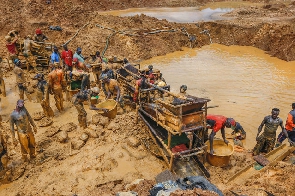The Youth Gate of Advocates for Christ Ghana has issued a call to action, urging immediate steps to combat illegal mining, known locally as "Galamsey," which they describe as a threat to God’s perfect creation and a serious environmental crisis.
In a statement released today, the group emphasized the importance of preserving Ghana's natural beauty and protecting the environment from the devastating impact of illegal mining.
They cited biblical references to highlight the spiritual and moral obligation to safeguard the earth, calling on the youth and various stakeholders to unite against Galamsey.
Drawing from scriptures, the group stated, “And God saw everything that he had made, and behold, it was very good” (Genesis 1:31), underscoring the need to protect Ghana’s lush landscapes, forests, and water bodies, which they view as divine masterpieces.
They lamented the destruction caused by Galamsey, noting that illegal mining activities have ravaged forests, poisoned rivers with toxic chemicals like mercury and cyanide, and threatened the country’s agricultural sector, including its vital cocoa industry.
“The intricate web of life, woven by the Creator's hand, is unravelling before our eyes as profit-driven motives eclipse the sacred duty to protect and preserve,” the statement read, echoing a call for collective action.
The Youth Gate of Advocates for Christ Ghana outlined several key recommendations for tackling the menace of illegal mining:
Enforcement of Existing Laws: The group called on the Minister for Lands and Natural Resources, Samuel A. Jinapor, to enforce existing regulations against illegal mining activities.
They highlighted Article 36(9) of the 1992 Constitution and the Minerals and Mining Act, 2006 (Act 703), urging the government to take stricter measures to protect Ghana's environment and ensure sustainable mining practices.
Civic Education and Community Engagement: The organization urged the Chairperson of the National Commission for Civic Education (NCCE), Ms. Kathleen Addy, to intensify civic education programmes focusing on environmental protection and the sustainable use of resources. They emphasized the importance of raising awareness among communities about their role in safeguarding the environment for future generations.
International Support for Sustainable Development: The group appealed to international development agencies and partners, such as the United Nations Environment Programme (UNEP) and the United Nations Development Programme (UNDP), to collaborate with the Ghanaian government in efforts to protect and restore ecosystems, manage forests sustainably, combat desertification, and halt biodiversity loss in accordance with the Sustainable Development Goals (SDGs), particularly Goal 15, which focuses on life on land.
Youth Involvement in Environmental Conservation: Highlighting the importance of youth engagement, the group encouraged all Ghanaian youth to take an active role in promoting sustainable development and environmental conservation. They called for increased youth participation in initiatives that protect natural resources, aligning with the National Youth Policy (2010) and Article 41 of the Constitution.
“Youth of Ghana, we currently constitute 57% of the population. We call upon you to embrace your role as stewards of the environment,” the statement urged, emphasizing that the future of the nation depends on the actions of its young citizens.
General News of Wednesday, 4 September 2024
Source: classfmonline.com

















